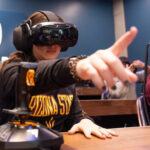Driving along the rugged Kilifi–Sokoke–Ganze road, the stark contrast between affluence and the reality of poverty is striking.
In this part of Kenya, poverty is not just a statistical record. It is a lived reality, especially in the remote Tsangalaweni village in Ganze Constituency, Kilifi County. For years, the community here has been defined by limited resources, poor infrastructure, and a chronic shortage of teachers, a situation that has made education a daily struggle for learners in this region. Sadly, this area has in the past gained notoriety for teenage pregnancy.
However, a quiet revolution is underway. Today a visit to ACK St Andrews Tsangalaweni Child Development Centre offers a refreshing new narrative. Here, the future is no longer a distant dream. It is unfolding in real time, powered by technology and hope.
On a calm Wednesday mid-morning, the serenity within the compound is broken only by the soft hum of learning, and a pin-drop silence that signals deep concentration. Inside the classrooms, young learners are glued to a sleek smart board, navigating interactive lessons with laptops at their fingertips. They are immersed in a digital world once thought a preserve for elite institutions.
At the centre of the ongoing transformation is virtual reality (VR), the tool turning humble village classrooms into portals to the world. With headsets strapped on, learners can travel from the arid Sahara Desert to the busy streets of New York, across the skylines of Dubai and to the wonders of ancient China—all without leaving Kilifi.
Global networks
“VR allows students to go beyond imagination and experience reality,” says Gilbert Maitha, the school’s ICT teacher, “A child from Ganze can explore places they never imagined. It makes lessons engaging, sparks curiosity, and creates excitement. Suddenly, learning becomes an adventure.”
The digital revolution here is more than a novelty. Through the Colibri programme, Maitha is able to assign and assess homework remotely using cloud-based apps—online and even offline. It’s a major leap forward for a village where internet connectivity was once a luxury.
“This was something we used to associate with schools in Nairobi, Mombasa, or even international schools like Brookhouse and Peponi,” Maitha adds, tapping the smart board to pull up interactive eBooks aligned with Kenya’s Competency-Based Curriculum.
“Now our children can learn using the same tools.”
Apart from core academic subjects, learners are also being introduced to skills such as video production, photo editing, graphic design, and online safety. The transformation is not just academic, it is holistic.
Currently serving 316 underprivileged learners in Tsangalaweni, the project, is funded by Compassion Kenya, a faith-based organisation working to improve educational access in underserved communities.
According to Reverend Silas Ndune, the centre’s patron, the journey began with just a few laptops, which weren’t even enough.
“So we wrote a proposal and requested support for a smart board. It costs Sh380,000 a sum we could never afford as a church. But thanks to Compassion, we got it,” he recalls.
Now, he says, the children can dream bigger, insisting that now there is no difference between them and kids in the cities because technology has levelled the playing field.
William Karisa, the project’s chairman, believes the digital skills being imparted will future-proof the children.
“The world is digital, even government services are online. This is the only way to ensure our children aren’t left behind,” he says.”
Senior programme support manager at Compassion International Kenya, Catherine Wamiti says the digital learning initiative is part of a pilot programme in five centres across Ganze, aiming to eventually reach 140,000 learners in 488 churches across 31 counties.
“We started in Ganze because church leaders here identified digital learning as a pressing need,” Wamiti explains, revealing that they have so far invested Sh1.7 million in the pilot phase alone and the results are already promising.
In a region where the odds have always been stacked against learners, the Tsangalaweni digital classroom is a beacon of possibility according to Nickson Bonke, who is the partnership facilitator of the Kilifi cluster.
“This technology is the same technology that learners in China, America, Germany and other parts of the world are using. It’s a reminder that with the right tools and a little support, even the most remote villages can prepare their children for a global stage,” says Bonke.
Quelle:
Foto: Gilbert Maitha, an ICT teacher at ACK St Andrews Tsangalaweni Child Development Centre, which has embraced digital learning, demonstrates how to use Smart Boards. PHOTO/Reuben Mwambingu


